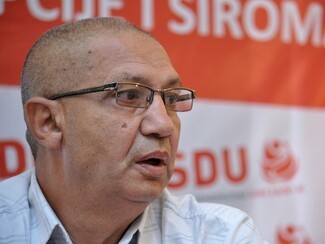Rom who challenged constitution

Rom campaigner Dervo Sejdic backs plans to establish World Roma Congress as the basis for the ‘mass-enfranchisement’ of Romani people…. writes Grattan Puxon.
He made the headlines as the Rom who challenged the Bosnian constitution over his right to stand for the presidency. Now Dervo Sejdic has entered the lists in what may prove to be another history-making cause.
He has enrolled as a voter in the International Romani Union sponsored endeavour to change the way Roma political representation is legitimised. At the same time Sejda is helping shape a means for combating in Britain another case of gross government-rooted racial discrimination.
In the previous fight with the constitutional authorities of Bosnia Hercegovina Sejdic had a single partner, Jacob Finci. Finci, a Jew and Bosnia’s ambassador to Switzerland, was like Sejdic, challenging a state’s ability to bar him from highest office on racial grounds.
The European Court of Human Rights ruled in 2009 that in these coupled cases Bosnia was violating a fundamental point of law. This point is expressed in Protocol 12 of Article 1 in the treaty signed by both
Britain and Bosnia.
It states no one shall be discriminated against by any public authority on the grounds of sex, race, colour, language, political or other opinion, national or social origin, association with a national minority, property, birth or other status.
Though given a wide net, the court had not before handed down such a judgement. Sejdic, who has acted as Roma Monitor for the OSCE and founded the NGO Kali Sara, is still awaiting satisfaction.
Bosnia has stubbornly limited its collective presidency to Serbas, Croats and Bosnian Muslims.
In similarly obstinately-held conditions the matter has lain in limbo as regards Roma representation on the UK Government appointed Holocaust Commission. Only here while Jews have been readily admitted, Roma have been excluded.
The issue may be brought to a head by a formal complaint to the UK Equality and Human Rights Commission. Albeit Prime Minister
Teresa May wants to do away with the Human Rights Act, and presumably the commission too.
"We are for the present simply appealing for mediation,” says London IRU member Gabor Boros, whose family were rounded up by the Nazis. “Roma and Jews suffered together - surely we must reach accord when it comes to remembering the Holocaust.”
If agreement is denied, there is the possibility of taking this case also to the European Court. Lawyers at the European Roma Rights Centre in
Budapest have been asked to take a look at it. But such processes are lengthy and judgements hard to enforce, as Sejdic has found.
Meanwhile, in his new cause, Sejdic has a growing army of participants, among them Boros. The concept for a Democratic Transition is a big one and the aims as large as any that might be espoused by a people emerging from centuries of a colonial-style suppression. The plan, adopted last year by the World Roma Congress, is to build a bank of voters large enough to delivery legitimacy to future political representation, while at the same time assuring its accountability.
Envisaged as a Roma Nation Mandate, this mass self-enfranchisement might one day gain recognition as an expression of a people's sovereignty. This could win for Roma the collective influence and respect their numbers around the globe would seem to warrant.
Those enrolling for electronic voting will be able to elect delegates, and participate in the direct election of leadership. The process is expected to transform the standing, composition and outcome of the 11th Congress, scheduled to take place in 2020, almost half a century after the founding London Congress in 1971.
For enrolment details email: dale.farm@btinternet.com
By Grattan Puxon
(Picture Dervo Sejdic © Socijaldemokratska Unija)